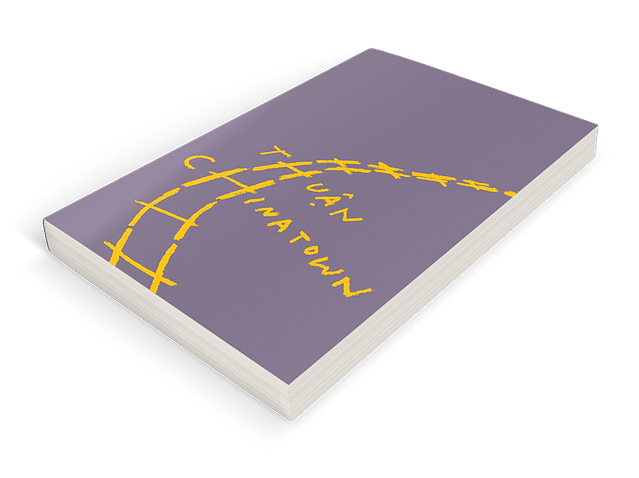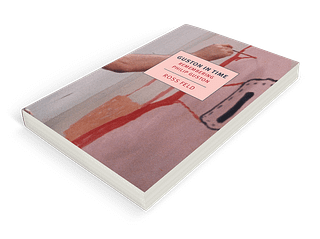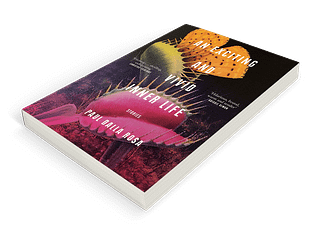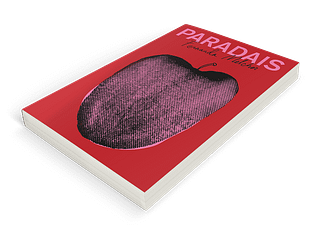
Chinatown
Thuận
Translated by Nguyễn An Lý
New Directions, $17
It was in high school Latin that I learned that language could have moods, and that one of those moods was the subjunctive. We use the indicative mood for statements of fact, but the subjunctive (which barely exists in English anymore) expresses possibilities, wishes, hopes and fears: “I wouldn’t trust those Greeks bearing gifts if I were you.” More recently, I’ve learned there exists a whole class of moods called irrealis moods, of which the subjunctive is merely one flavor. André Aciman’s recent essay collection, Homo Irrealis, is entirely dedicated to these moods, celebrating the fact that they express sentiments that fly in the face of settled reality. “Caught between the no more and the not yet, between maybe and already, or between never and always,” he writes, “irrealis moods have no tale to tell — no plot, no narrative, just the intractable hum of desire, fantasy, memory, and time.”
That quote also happens to be a serviceable description of the novel Chinatown, translated from the Vietnamese by Nguyễn An Lý, whose unnamed narrator is one of the most reluctant occupants of reality I’ve encountered in literature. A Vietnamese woman living in Paris, the narrator is trapped on the Métro with her young son Vĩnh for the entirety of the book as the police investigate a suspicious duffel bag. What unfurls is a hypnotic, nearly unbroken stream of thought in which it’s difficult to parse what’s a memory, a dream, a projection into the future, or a wish-fulfillment sequence. It roves from her time at university in Leningrad to the nagging of her highly ambitious parents back in Vietnam to the rowdy French kids she teaches at a secondary school to lengthy excerpts from a novel she’s working on. Phrases and sentences are repeated like mantras. There are no quotation marks and no paragraph breaks.
For the most part her thoughts stray from and return to Thụy, the husband who walked out on her after a year of marriage, one month after Vĩnh was born. Eleven years later the narrator still revisits this psychic wound over and over and over, clinging to the things she knows and tormented by what she doesn’t:
He walked to Hàng Cỏ station. He boarded the eleven pm Thống Nhất. That’s all I knew about his departure. After that, where he was, whom he met, what he did. I didn’t know a thing. … Even now I still don’t know where he was, whom he met, what he did. For the last twelve years I have been wanting to see him, to ask. How he is living his life now. I don’t need to know. But I want to know where he was, whom he met, what he did, in those days.
Through her fog of pain and bewilderment, we gain a sense of why he left. Thụy is ethnically Chinese at a time when tensions between Vietnam and China culminate in a border war in 1979. In the years the narrator and Thụy attend high school in Hanoi, “everybody called Thụy that Chink. Spawn of Deng Xiao Ping. Goon boy of Beijing.” He’s simultaneously surveilled and ignored by teachers, administrators, and the other students, and barred from attending the Polytechnic University; the narrator’s parents never acknowledge her marriage to Thụy, much less attend the wedding. All the narrator knows now is that he lives in Chợ Lớn, Saigon’s Chinatown, a place she constantly thinks about even though she’s never even been there. It only exists, hazily sketched, in her imagination, informed by the works of Marguerite Duras and a picture Thụy once sent of himself “standing by a two-storey house, a shop sign with Chinese lettering, a pair of Chinese lanterns.” These images recur again and again: the two-story house, the lettering, the lanterns. “I cannot forget Chợ Lớn,” she thinks. “I have never once been to Chợ Lớn. But still I can never forget Chợ Lớn.”
Our narrator, in short, is profoundly out of joint, displaced both in space and time, about as lost in irrealis moods as you can get. And if the past is longed-for and unreachable, the future is downright abhorrent. Her eleven-year-old son, Vĩnh, is obsessed with his Chinese heritage — he and Thụy have a relationship — and dreams of a glorious future tied to China’s growing geopolitical power, a future in which he leaves his mother and severs her last remaining connection to Thụy. And some of the most sharply hilarious sections of the book center on the narrator’s parents, who practically worship “the future.” They’re the reason the narrator grew up without cartoons or comic books or birthday parties: “If it wouldn’t lead to tens and praise in my school reports, ‘useless’ was the only epithet my parents found applicable.” It’s also why she spent five years studying in Leningrad — a diploma from a Soviet university being, at that point, a marker of prestige. The collapse of the USSR weighs heavily on the family home:
My parents shed a single tear over the socialist bloc, but soaked two handkerchiefs between them over the word “future.” For a whole week my mother was ill in bed, my father wouldn’t touch his food, the house was like a house in mourning. On the eighth day, my parents roused themselves. My parents are not the resigning type. They wrung out both handkerchiefs and resolved to find a new promised land to sow the F word.
And so the stunned narrator is bundled off to Paris shortly after Thụy leaves her, where she eventually cuts up her parents’ letters and wonders if she spent too much of her life under their sway.
Not exactly the triumphant immigrant narrative. One gets the sense that the future happens to the narrator rather than something she enacts herself, that she’s in fact trapped in someone else’s aspirational notion of the future when all she wants is to go back to the past. She admits to the Paris immigration office that she only wants to be naturalized so she doesn’t have to spend all day in line once a year, and they shake their heads. She knows nearly nothing about her adopted land and doesn’t seem to care: “I’ve worked ten years in the education system and still I’m not used to the various holidays. I can’t tell the Normandy sea from the Mediterranean, can’t remember which one is shark-infested and which isn’t, which is bitter and which is salty.” There’s a Frenchman she seems to spend quite a lot of time with, whom she calls “the guy”; her parents harbor elaborate fantasies of their wedding. But her feelings towards him are unspecified, a blank. A line appears again and again in her ruminations, advice her friends give her at her wedding to Thụy: “You should forget in order to live, they told me. It’s the truth. Forget in order to live.” It’s the one thing, of course, she can’t do.
Is it any wonder that the main sensory experience of reading Chinatown is a sort of claustrophobic discomfort? I would sit down with the novel and, after an hour or so, find myself yawning furiously or falling into a trance indistinguishable from the half-sleep one enters on an extremely long bus ride. But that feels like the point: the narrator’s life is about as confined and isolated and marginal as you can get. She’s sardonic about the racism of her fellow teachers, whose distaste for her “stress-inducing face” keeps her out of sight when she’s at work. “I don’t want the whole school to explode in a collective fit of stress,” she thinks, “so when they have their break I stay in the classroom, when they have lunch in the cafeteria I sit in the staffroom chewing my sandwich.” I mentioned above that the narrator is unnamed, but in fact everyone she knows in France calls her Madame Âu — Thụy’s last name, and an ethnically Chinese one. Yet she doesn’t have any real connection to the Chinese French community in the thirteenth arrondissement: “I can hardly run to them, grasp their hands and say, my husband is also ethnically Chinese.” She can’t afford to live in the neighborhood, anyway — instead, she commutes there by bus from Belleville to buy roast pigeon for Vĩnh. In one of her dreams she yells, “bù shì yuènán rén” (“I’m not Vietnamese” in Mandarin); in another, “bù shì zhōngguó rén” (“I’m not Chinese”). The narrator is doubly marginal, disconnected from any kind of community, having rejected her own nationality for her husband, only for him to reject her. Then, of course, there’s the fact that during the course of the book itself she’s immobile, literally trapped in a train car that’s neither departed nor arrived. Chinatown’s first and last sentences are rigid bookends that state the time on the narrator’s watch: the novel takes place over precisely two hours.
If the narrator seems trapped in every way, a woman whose imagination and memory are her only forms of escape, it’s also significant that she’s a writer of fiction — fiction being, after all, another useful way to slip the bounds of space, time, and one’s present circumstances. Her story “I’m Yellow” involves a man who goes to great lengths to get out of his marriage. The story appears suddenly, after she admits that she was never able to write directly to Thụy during or after their relationship. It reads like a way to get at her obsessions sideways: Thụy left on a train, so the protagonist of “I’m Yellow” is a veteran train-hopper, with all the mobility and freedom she lacks. Writing fiction, Thuận makes clear, is a fundamentally obsessive act: Even if the world’s moved on, a writer of fiction can constantly revive, on the page, the things they simply can’t let go. The narrator thinks of “I’m Yellow,” at first, as a short story: “I knew I had to end it there if I wanted to start something else. Like wrapping up a period of one’s life.” And yet, she concludes just a few lines later, it can’t be a short story, because “I knew how hard it is, the act of ending something. As hard as wrapping up a period of one’s life.” Another excerpt of “I’m Yellow” appears later in the book, and eventually she starts calling it a novel.
In yet another boundary-crossing complication of “fact” and “fiction,” the narrator of Chinatown shares certain characteristics with Thuận herself. We’re informed offhandedly that the narrator is the author of a book called Made in Vietnam whose main character is a woman named Phượng — which is true, in real life, of Thuận as well. These moments are gleefully self-referential, the narrator uncharacteristically clear-eyed and wry and even confident, shooting off barbs about how Westerners think all Vietnamese names look identical and chortling at the suggestion that her readers might want paragraph and chapter breaks. Even the title “I’m Yellow” reads like a self-aware jibe at the way Southeast Asian writers are pigeonholed in the West, the way “those from Vietnam, Laos or Cambodia were only seen as representatives of the numerous wounds of war and poverty.”
Chinatown is sad, yes, but it’s also a delightfully prickly and defiantly inscrutable act of resistance: against simple narratives, against our aversion to what we don’t understand, and against anything soullessly practical. It insists that we make space for the things that don’t make sense, most of all our absurd dreams and longings. “Not until my last novel will I know why I write,” the narrator thinks, in her endless circling. “Not until my last novel will I be able to understand him. … Thụy is a mystery. I have loved him as a mystery, the mystery to end all mysteries.” Isn’t that, in the end, what all love is?
Chelsea Leu is a critic whose work has appeared in The New York Times, The Atlantic, The Believer, Bookforum, and elsewhere.


